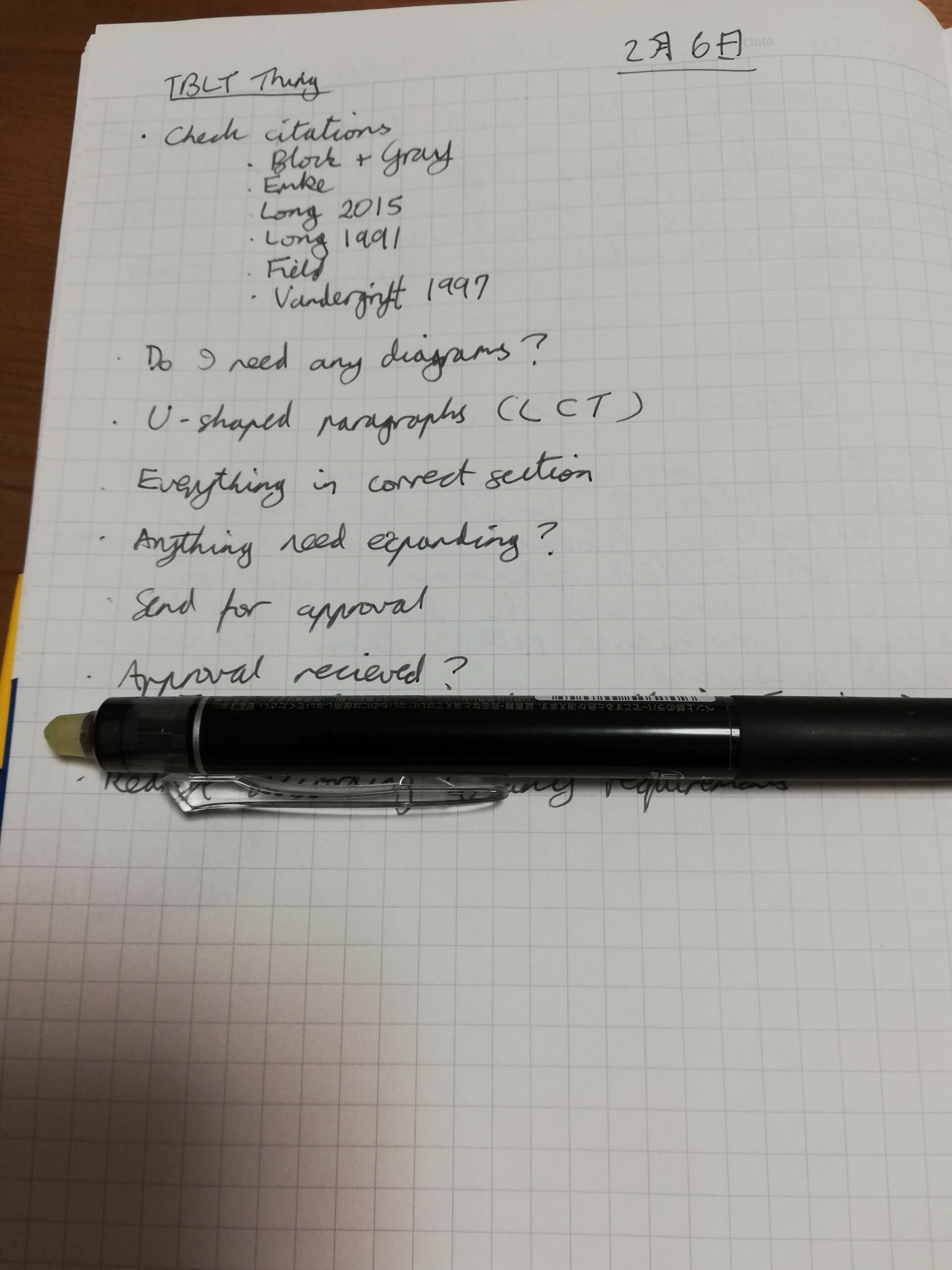
Manage projects with Bullet Journalling

Freelance Teacher Self Development
For you, then your learners

You get your schedule for the new teaching year. You have a new course to teach. Oh no! How much work?! Yes, it is a lot. Hopefully I can help streamline out the panic. Learn from my mistakes instead of your own.
What kind of course is it? Is it discrete skills, a mish-mash of skills, content, or merely an idea crafted by nymphs from a gossamer of buzzwords? This is going to dictate a lot about how you approach it.
If it’s all four skills, what can’t the learners do yet that you want them to do? If you aren’t sure, ask or have a good think. What kinds of people are your learners? Pope-Ruark (2018) advocates creating stakeholder profiles for your course. Put yourself in these different people’s shoes. Make them as realistic as possible. ‘Talk’ to them in your head. Ask questions to them and let them answer your questions and it makes this process easier. Yes, I know this sounds like the ravings of a man possessed but trust me here, or give it a try and if you don’t like it, try it your way.
Well, first a famine and then a feast, that is, if self-indulgent nonsense is at all a signifier of a festival atmosphere. 3 posts in 36 hours!
Sometimes I think of expertise in teaching as the intuition that being time served gives to you. It’s not the sleepwalking through a class but that you can do everything through habit and stay alert to the novelties of the day. Other times I think of it as the way that you can get through a lesson without needing to plan a rationale with a 3000-word literature review and a methodology section. You already have the skills to pay the bills, as it were.

However, comfort zones are made to be broken out of. This year I am teaching a listening module (yay!) with endless amounts of faff for the resources (no way!) but which I chose to do myself (ey?) in the name of pedagogical thoroughness (hmmm!). Where do we draw the line between martyring oneself to The Absolutely Correct Way Based on Proper Scientists of Learning and being a heretic to the cult of Maybe This Is Good Enough and The Students Will Never Bloody Notice?
“It’s why they pay us the big bucks,” said a person (this very week) that would be unlikely to read this blog. Except, I feel that part of me in the standardised parts of my job feels very frustrated that some of what I do is not The Absolute Correct Way but is definitely only Maybe Good Enough. The bits of my job where I have designed the syllabus and where I have lots of independence make me really happy, although for a few of those there were some marathon reading sessions on good practice for reading and writing pedagogy.
“That book basically teaches itself,” said someone in a staff room this week. I didn’t even have a small aneurysm. I sat on my hands and did nothing; no arguing, not even a grumble. I just disagreed, felt that I understood the time pressures but wondered why they even had a Master’s degree if they enjoyed being deskilled so much.
Anyway, there’s assessment as well. Not being much of one for exams, them being a single event that might not be representative of learning development, I sort of eschewed them as much as possible until this year going with portfolios and ongoing assessment. Unfortunately, I don’t think portfolio assessment is the way to go unless you are teaching a light load and have plenty of time for painstaking assessment necessary. My portfolio assessments make up a much smaller proportion of grades this year, but I do have exams to give but they are smaller, less stressful affairs. I would much rather be able to conduct task-based tests more often, but 30 in some classes and I teach 30 hours a week at different places and with different systems. The Absolute Correct Way is toast again.
Am I a bit sorry? Well, I have the flail out, yes. Is there any way around it? Well, probably not until I start a Patreon or something (joke).
So, what can be done? Well, at best, I can probably plan my time a bit better, which should be easier now I cancelled Netflix. I could do a bit more assessment in down time and use time at home as down time instead. I also have a lot of repeating classes next semester, so that is a small mercy and I won’t need to mess about with video editing software on a crappy Linux computer with insufficient RAM at midnight next autumn or winter.

Freelancing is highly romanticised at the moment, or so I feel, on the ‘productivity’ websites. However, the fact is, I would love to be a full-time employee. What leads me to be a freelancer/serial part-timer (FSPTer) then?
Now, before all you other long-in-the-toothed folks like me start thinking about going Omar, don’t think it’s all sweetness, think about this.
Most of your company classes will be agency work. Agencies will not pay you if the client cancels with over 24 hours notice. Will you fill that slot? Will there be a Bambi’s mother-zombie-crossover live-action film? In a language school, you get paid regardless, unless you work for a total piece of crap.
Sometimes an agency will make a verbal agreement with you, nothing solid, but you block your schedule, and the organisation then does further shopping around and drops your agency. They take no hit other than salesperson time. You lose ground on the slots you could have applied for.
“Private students are the way to go,” you say. I will say that you may have a private that treats you well but most get flaky and cancel at the last minute. I charge the full whack if there’s less than 24-hours notice, or stop bookings any more than a week in advance. Hit any private with these and they will soon stop taking lessons if you charge a rate that is reasonable to you. This can be good though; you don’t want to be waiting around for people that don’t respect you but only say that they do.
God, I hate admin. You will have at least one agency time sheet to fill in, plus student attendance. Add to that any marking if you have writing classes that turn out substantial work, and there will always be the last-minute thing that you will not get office staff help with because you don’t have office staff – you’re freelance. Add tax returns in a foreign language and messing about with multiple document formats going between phone, Pages, MS Office, Libre Office and other permutations and you’re on a one-way ticket to Self Medication Station.
Basically, you learn to prioritise. My question is “If this isn’t done, will my family starve?” You’d be surprised at how much is let go. However, you still have to balance goodwill and lackadaisical wherewithal.
You will be able to shoulder everything a black hole can absorb in an aeon and more. This is because, on a busy day, you might be carrying four textbooks, a notebook, a diary, maybe a portable speaker for listening tasks, food and whatever else you might carry to kill time (novels, game machine, scale model of the Bismarck, etc.) This exercise will not stave off The Belly.
You will get hungry and every subway or train station kiosk will beg you closer with its promise of Snickers, M&Ms, sweet breads, sandwiches, ambiguous baked goods with exotic seasonal flavours. You will not have willpower, especially at five o’clock on a Thursday after a class at a food company and just before teaching a lesson on dining out. You need exercise. You will crave exercise but you might not have time.
You will spread yourself stupidly thin when you can get work (which is basically all the seasons when weather is crap except Christmas and New Year) and have more free time than you can shake a stick at over summer, unless you teach at a summer camp, though many of those pay rubbish money for staying on-site in the sticks miles from home or miles from the pub if you go in for that.
I am getting better at managing this but the cancellations do mess this up a bit.
Do I like my job? Yes, I do. Do I like freelancing? That’s not really relevant; my family likes having a place to live and being able to eat. Some days I like freelancing more, other days less. It’s about how you get by, isn’t it?